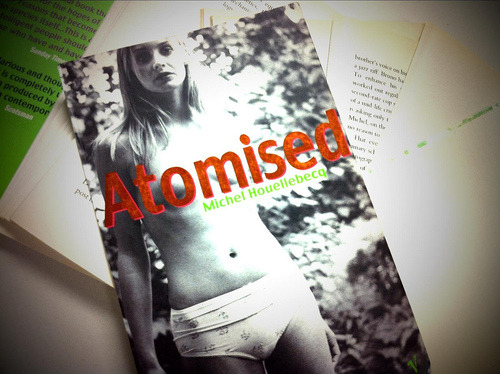[box type=”info”]Part Two of Cutting Up[/box]
The other night I sat on the porch with some friends and acquaintances discussing this and that. I had my iPad with me, and I was showing a friend what I had been doing with some old books. I explained that the process of getting the books on my iPad involved destroying the physical form of the book so it could gain a new life in digital form. Someone I hardly know got truly offended: “how can you do such a thing to a book?! I love books, and you’re destroying them!” She couldn’t even look at me.
Her reaction might have been mine just a year ago. Until the iPad came out, I would have been the first to argue that our current incarnations of microprocessing technology — the personal computer — does not provide the same reading experience as a book. Period. Perhaps it’s the nature of the machine that necessitates the opposite behaviors that are required to really read. There is something about sitting down in a quiet corner with a book that inspires careful contemplation, thoughtfulness, and introspection. Real reading — the kind that you need to practice to actually take in something in a meaningful and profound way — deserves all of the attention we can bring to it. One thing I’ve learned from teaching is that you never read more carefully than when you know you have to teach something. This I read books: as if I’ll have to teach the text sometime soon. The web? Not so much.
Reading on the web — probably the most popular form of reading done off a computer screen — is not the same thing. I’m not saying that it necessarily can’t be, but in my experience it is not. Something about the computer — even a laptop — inspires a cursory, quick, and superficial consumption of text. Perhaps because it looks more like a television than it does a book? Perhaps we are trained that what comes to us through a monitor should be consumed in a certain way, whereas that which is found on leaves in a cloth binding must be absorbed in another way. Books are like holy artifacts; computers, to paraphrase Norman Mailer, are machines of the devil.
I still hear people say that they can’t proofread or edit on a computer screen. There’s something about the printed word on a physical sheet of paper that allows our minds to take it more seriously than we would something appearing on a computer screen in a web browser. Seriously, I’m pretty sure I could never read a book on a PC.
Perhaps it’s the notion that what we see on the computer screen is somehow transient and impermanent — that it can disappear with a flick of a switch or the press of a key. Books sit heavily on shelves. They are weighty matter that can be handled and not so easily disposed of. Until recently, the idea of publishing was like, in Gilgamesh’s words, “having one’s name stamped in bricks.” If you were mentioned by a poet, you achieved a kind of immortality. “Literature” deserves this treatment, after all. It is weighty. It matters. It should be in books, not on computer screens. Sven Bickerts echoes this sentiment: “our entire collective history–the soul of societal body–is encoded in print. Is encoded, and has for countless generations been passed along by way of the word, mainly through books” (20). This is significant, no?
Birkerts goes on to lament what he sees as an inevitable paradigm shift away from print to the digital. He states that we have lost the ability to read, and now it seems I am destroying books. What’s going on? Am I really committing some sort of heresy against humanity? Against the holy book?
I think not. The iPad is a new medium, something less like a computer and more like a book. Computers are for business; iPads are for personal time. I create on the computer; I enjoy on the iPad. Indeed, these are too easy generalizations, and there are many crossovers between the two, but I use my iPad in a different way than I use my computer. If anything I can say the following: I read more now because of the iPad than I did just a year ago. This is profound because I am a professional reader. Yes, I do it for a living. I enjoy the experience of reading from my iPad more than I do from a paperback book. I can also carry around a library with me on the iPad, dispensing with the need to pack ten books for a short trip.
The only advantage I can still see in using a physical book is that I can more easily annotate it. Yes, I must annotate all of the books I teach. But I do not teach all of the books I read. I predict within the next year that this will not even be an issue. Apple has already made significant improvements to reading PDFs using iBooks. I also predict that we will be using our word processors to easily make EPUB files that are meant to be read from the iPad rather than printed. Long live the trees!
Yes, we are moving closer to being all digital. This is not something to be lamented.
I tried to explain this to my indignant porch friend, but I’m not sure how convincing I was. In fact, like her, I still have an irrational nostalgia for the book — especially when considering rare or new books — that I will discuss later. Also, I’ll discuss the implications for publishing, especially for those of us who have not been too successful in traditional markets.
Work Cited
Birkerts, Sven. The Gutenberg Elegies: The Fate of Reading in an Electronic Age. New York: Fawcett Columbine, 1994.



















